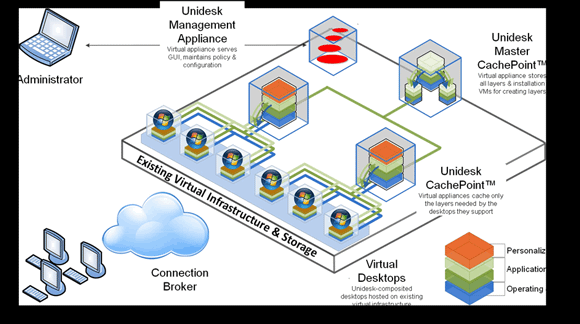As more IT organizations become familiar with virtual desktop infrastructure (VDI), many of them have begun to understand the inherent limitations of VDI when it comes to application management and deployment.One company trying to fix this part of the VDI equation is Unidesk, which has developed a new layer of software for managing desktop virtualization.
According to Ron Oglesby, chief solutions architect for the company, Unidesk works by adding a layer of management software that leverages file system technology underneath a VDI deployment that is designed to make it easier to not only manage applications, but also keep track to the changes that end users make to those applications. One of the big complaints about VDI is that every time an application is customized, those changes get wiped out every time the central VDI servers update the application portfolio.
Specifically, Oglesby said Unidesk adds a layer of management software that lets VDI desktops be created from cleanly separated Windows, application, and personalization components. Unidesk merges these components using storage virtualization so Windows boots up and runs normally. This approach makes it easier to manage applications and keep track of changes end users make to their profiles and the applications they install.
Oglesby, who recently joined Unidesk from Dell, says the Unidesk architecture also helps reduce the storage overhead associated with VDI implementations that can get out of hand as virtual images start to grow in size.
One thing is increasingly clear: As IT organizations become more familiar with VDI, an approach to managing VDI environments that are more than likely going to consist of software from VMware, Microsoft, Citrix and others is going to be a critical piece of IT infrastructure software.
As none of these companies are likely to make it easy to manage anybody’s else’s VDI implementation, the opportunity to insert some third-party software that rationalizes all these VDI offerings under a common management framework is something that shouldn’t be ignored.



